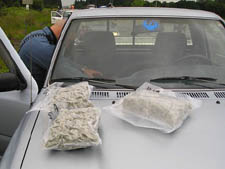Voters in Portland, Oregon, will not be voting this November on an initiative that would have made marijuana the lowest law enforcement priority for city police and prosecutors. Despite spending nearly $100,000 in an effort to gather enough signatures to qualify for the ballot, initiative organizers came up short.
Sponsored by Citizens for a Safer Portland with financial backing from the Washington, DC-based Marijuana Policy Project, the initiative would have created a city ordinance defining marijuana law enforcement as the lowest police priority and would have barred city law enforcement from accepting state or federal funds to enforce the marijuana laws. It would also have created a civilian oversight committee to monitor compliance by law enforcement and would have required Portland police and prosecutors to make periodic reports on marijuana arrests and prosecutions.

"It is a disappointment," said MPP communications director Bruce Mirken. "I haven't seen any sort of post-mortem that would say clearly what went wrong, but you can't be happy about investing in a project and not succeeding. The bright side is a number of these initiatives did succeed in getting on the ballot in other places," he told Drug War Chronicle.
Portland initiative organizers needed to turn in 26,691 valid signatures to qualify for the ballot. The group managed to gather just over 40,000 signatures, but by the time it scrubbed the list for duplicates and invalid signatures, they were down to 31,523. But then the city threw out several hundred sheets containing nearly 4,500 signatures because signature-gatherers had initialed the sheets instead of signing them with their full names. By then, the signature count had dwindled to 27,174, so when a city election office random sample of the remaining signatures showed about one-third invalid signatures, organizers conceded defeat.
"That matched with our internal validity checks," said Citizens for a Safer Portland's Chris Iverson. "That meant there was no way we could make it; we were only about two-thirds of the way there," he told Drug War Chronicle.
Iverson said the failure to get the required signatures was a combination of organizer error and a hostile local election machinery. "We made some mistakes along the way," he conceded right off the bat. "When we first started, we didn't budget for duplicates and out-of-Portland signatures because I had no idea there would be so many. If we had been through this before, we would have been aware of this," Iverson said.
"We had 4,500 signatures thrown out for what they call circulator error," Iverson complained. "Here in Oregon, we have very strict rules. If they can't read the circulator's signature on the page, they go to a voter registration database. If they can't match the signatures, they throw out the whole page. We had two people who each did hundreds of sheets, and their sheets were thrown out because they used shorthand versions of their names," he explained. "We thought because we had official documents, we would be okay, especially because they had allowed it in the past with other campaigns. But they said they would not count them because they weren't an exact match."
Such official inflexibility thwarts the democratic impulse, Iverson said. "These kind of rulings are unfair and anti-democratic," he said. "A lot of initiative campaigns here are having problems with this rule."
Iverson and Citizens for a Safer Portland may be bloodied, but they are unbowed. "This initiative helped bring together people who would never have sat foot in the same room before, and we are ready to get ready for the next project. I've been an activist for 15 years, and I consider myself a professional campaigner. Professional campaigners don't make the same mistakes twice."
Iverson wants to help others avoid making the same mistakes too -- he is putting together a package of questions that would-be initiative organizers should address before moving forward with a campaign.
This work by StoptheDrugWar.org is licensed under Creative Commons Attribution-ShareAlike 4.0 International
Add new comment